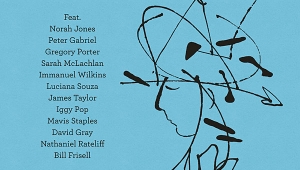| Columns Retired Columns & Blogs |
Recording of March 2001: The Houston Kid
RODNEY CROWELL: The Houston Kid
Sugar Hill SUG-CD-1065A (HDCD). 2001. Rodney Crowell, Peter Coleman, Steuart Smith, Jim Dineen, prods.; Hank Williams, eng. AAD? TT: 47:01
Performance *****
Sonics ****
But a few obscure LP masterpieces still languish in the vaults, waiting—probably in vain—to be reissued. Heading the list of albums I'd like to see finally released on CD are Rodney Crowell's three Warner Bros. albums: I Ain't Livin' Long Like This (1978), But What Will the Neighbors Think? (1980), and Rodney Crowell (1981). Studded with great originals like "Leaving Louisiana in the Broad Daylight," "Ashes By Now," and "'Til I Gain Control Again," these albums are the bedrock of Crowell's eminent but still mysteriously unrenowned legacy.
Sugar Hill SUG-CD-1065A (HDCD). 2001. Rodney Crowell, Peter Coleman, Steuart Smith, Jim Dineen, prods.; Hank Williams, eng. AAD? TT: 47:01
Performance *****
Sonics ****
The mad scramble to reissue on CD everything originally released on LP is now mostly over—almost everything that might be profitable is already out there. The major record labels have reaped untold riches from reselling their back catalogs, and are now trying to duplicate that slick feat by introducing SACD and DVD-Audio. Whether even music fanatics like the staff and readership of Stereophile will bite on that night crawler is another story for another day.
 | |
Born, as the title of this album so proudly proclaims, in Houston, Crowell arrived in Nashville in 1974. There, he immediately fell in with a group of songwriters, most of whom would go on to become the cream of Americana-styled composers: Guy Clark, Townes Van Zandt, and, a little later, Steve Earle. After four years as part of a particularly smokin' incarnation of Emmylou Harris's Hot Band, Crowell launched his solo career in 1978. His breakthrough came a decade later when his 1988 album on Columbia, Diamonds and Dirt, yielded five number-one country hits, including "I Couldn't Leave You If I Tried," "She's Crazy for Leaving," and the incomparable "After All This Time." Along the way, the aspiring singer-songwriter—whose parents had met at a Roy Acuff concert—married into one of country music's first families when he wed Johnny Cash's daughter, Rosanne Cash, in 1979, after producing her 1980 breakthrough album, Right or Wrong.
Like Guy Clark, whom Crowell has always credited for mentoring him when he first arrived in Nashville, Crowell remains decidedly left of Music Row on his intense and autobiographical new album, The Houston Kid. The connections to his spiritual kin are many: One of Clark's earlier songs, about Townes Van Zandt, is also called "The Houston Kid." And this album's opener, the natural single of "Telephone Road," is yet another paean to the fabled honky-tonk-lined highway outside Houston that Steve Earle has celebrated in his own song of the same name.
The album is loosely arranged around the idea of what Crowell calls "the underside of my East Houston roots." Musically, it's filled with Crowell's unique style of folk rock, with decidedly peppy, pop-leaning hooks that tempt at every turn. Fiddles and pedal-steel guitars are few and far between—the dominant flavor is more Britpop than backwoods.
After "Telephone Road," which focuses on a kid's sensory impressions—ice cream, cherry Cokes, salty watermelon slices—and includes dense couplets like "Drive-in movie in the trunk of my car / One-eyed sailor in an ice-house bar," The Houston Kid lurches into "The Rock of My Soul," the first of two tunes (the other being "Topsy Turvy") that explore in painful depth the tempestuous relationship between Crowell's parents. Even more sensitive subjects are broached in "I Wish It Would Rain" and "Wandering Boy," which forthrightly detail the misadventures of a pair of brothers, one of whom becomes a male prostitute in southern California, eventually contracts AIDS, and returns home to die in the care of his homophobic brother. Not exactly the sort of subjects on which most Nashville classics are built. Speaking of building, the sonics here have beautiful bass extension and an overall clarity that's impressive even for an HDCD-encoded disc.
Despite the sometimes raw emotions embodied in the lyrics, what underlies and powers The Houston Kid are songs that are so well-crafted they have it both ways: the craft compels the head, while the melodies excite the toes and the heart. Hummable hits abound. This is folk rock at its most ambitious and effervescent. One of the most enviable melodies here, "Why Don't We Talk About It," is the kind of pop/rock bonbon that used to have label honchos salivating over Crowell's "crossover" potential. It's also a perfect example of why he's one of the world's (yes, the world's) most covered songwriters. And for anyone fool enough to doubt the alchemy of head and heart inherent in Crowell's best work, there's "I Walk the Line Revisited," in which he walks an impertinent line by marrying new lyrics to the original melody of his former father-in-law's most famous hit, then asking the Man in Black himself to sing a few verses. The result, with Cash in glorious form, works like a charm.
In the end, charm is what hovers over and around this record: the kind of ambiance and quality, the right place/right time vibration that comes along every so often when the planets align, a songwriter's life settles into a good place, and his talent is free and motivated to will out. When songwriters and musicians say "he's got a good record in him," it's creations like The Houston Kid that they have in mind.—Robert Baird
- Log in or register to post comments




































